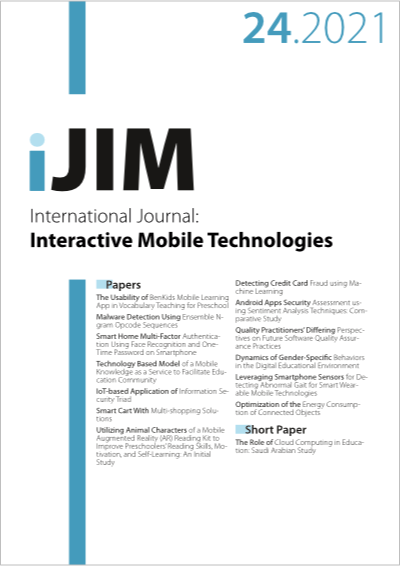Technology Based Model of a Mobile Knowledge as a Service to Facilitate Education Community
DOI:
https://doi.org/10.3991/ijim.v15i24.27335Keywords:
M-learning, Mobile Technology, Knowledge Management, Performance Expectancy, Effort ExpectancyAbstract
Technological enhancements as well as the demand of students to access learning information on time and quickly has resulted to the development of e-learning across the world. Mobile learning has been adopted by most learning institution as a mobile technology that allows learners to access learning materials and share information among themselves and respective educators easily and quickly. This article discusses the intention of users in learning environment adopting m-learning, their perceptions as well as factors that hinder implementation of m-learning in the gulf region. Effective mobile technology adoption also enhances knowledge management through mobile applications that allow information capture, storage, retrieval and sharing. This study uses systematic literature review to collect information from post 2017 studies previous conducted by other researchers. Articles were searched through highly ranked databases from which 657 journals were identified. After the screening and eligibility assessment, 24 journals were retrieved. The back and forward search retrieved 4 more journals bringing the total to 28 journals that were included in the study. Based on this information, a conceptual model is developed to help assess the m-learning perceptions, adoption intentions and factors influencing its adoption among learning institutions in the gulf region. This model is built based on the Theory of Planned Behavior and Unified Theory of Acceptance and Use of Technology. Based on the developed model, main constructs such as performance expectancy, effort expectancy and social influence are greatly impacted by other factors like learner’s creativity and mobility.
Downloads
Published
2021-12-21
How to Cite
Badawood, A., & AlBadri, H. (2021). Technology Based Model of a Mobile Knowledge as a Service to Facilitate Education Community. International Journal of Interactive Mobile Technologies (iJIM), 15(24), pp. 49–60. https://doi.org/10.3991/ijim.v15i24.27335
Issue
Section
Papers
License
Copyright (c) 2021 Ashraf Badawood, Hamad AlBadri

This work is licensed under a Creative Commons Attribution 4.0 International License.


